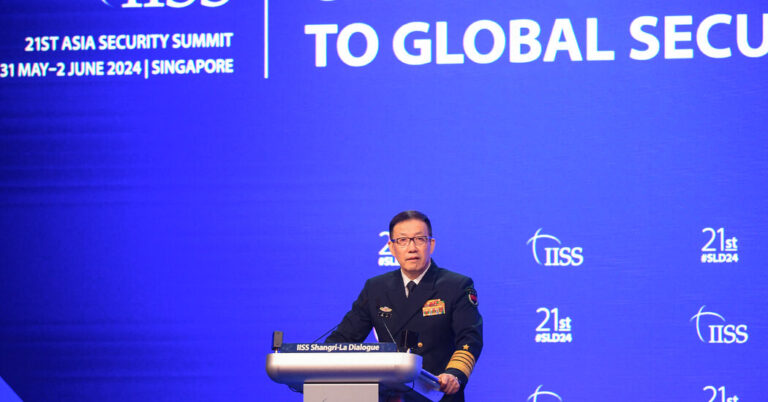Tensions over U.S. global power were on full display at a security summit on Sunday, with China accusing Washington of stoking tensions over Taiwan and the South China Sea, and Ukrainian President Volodymyr Zelensky calling for greater support for his embattled country.
The scenes were on display at the Shangri-La Dialogue, an annual security forum in Singapore that has long been a barometer of the ups and downs of U.S.-China relations.
U.S. Secretary of Defense Lloyd J. Austin and Chinese Defense Minister Dong Jun met this year, though the two countries’ defense officials do not necessarily meet at the meeting. But Admiral Dong made clear that China remains deeply hostile to U.S. influence and alliance-building across Asia, particularly U.S. support for Taiwan, an island democracy that China claims as its territory.
“These malicious intentions are dragging Taiwan to the danger of war,” Admiral Tung told the meeting, after an indirect but clear reference to U.S. military and political support for the island. “Anyone who tries to separate Taiwan from China will be crushed to pieces and invite their own destruction.”
Dong’s warning, along with other bellicose rhetoric from Chinese military officers at the meeting, reflects the fact that Beijing and Washington remain deeply divided on several fundamental regional issues even as they discuss ways to prevent military friction at sea and in the air from spiraling into a crisis.
China last month carried out menacing two-day military drills around Taiwan and accused the island’s new president, Lai Ching-te, of trying to push for independence. His Democratic Progressive Party maintains Taiwan has an independent status but he has suggested he does not seek full independence.
In his speech on Saturday, Austin warned against “actions that erode the status quo and threaten peace and stability in the region,” an indirect allusion to Chinese pressure on Taiwan, and said that despite China’s claims to the South China Sea, “we all share an interest in ensuring that the South China Sea remains open and free.”
But Admiral Dong blamed an unnamed Southeast Asian country – apparently the Philippines – for stirring up trouble over islands and shoals in the disputed waters, again suggesting that the US is the real culprit.
“A country, instigated by external forces, has abandoned bilateral agreements, broken promises and carried out planned actions to cause the incident,” he said in a speech to diplomats, military personnel and experts from across Asia. “China has exercised sufficient restraint in its response to such provocations, but there are limits to this restraint.”
The Philippines is in a dispute with China over territorial claims in the South China Sea, which Manila calls the West Philippine Sea. In 2016, the International Tribunal for the Law of the Sea (UNCLOS) rejected China’s sweeping claims in the South China Sea, including in shallow waters near the Philippines. Beijing has ignored the ruling.
Speaking at a meeting in Singapore, Philippine President Ferdinand Marcos Jr. warned Friday that the Philippine government may seek U.S. assistance under the mutual defense treaty if Chinese vessels cause the deaths of Filipino sailors.
A U.S. official who heard Dong’s speech took issue with his portrayal of China and its People’s Liberation Army as innocent victims in a regional conflict. The official, who spoke on condition of anonymity to discuss geopolitical tensions, said the admiral’s assertions were inconsistent with the Chinese military’s “coercive activities” in the region.
Also in Singapore, Austin and other Western officials were reminded that Ukraine’s more than two-year war against Russian aggression continues to demand the attention of national leaders and taxpayer resources.
Zelenskiy joined the meeting at short notice. He spoke with Austin on Sunday and received an update on U.S. security assistance before Zelenskiy spoke, according to a Pentagon bulletin of the meeting.
Faced with Russian military advances into Ukraine, Zelenskiy has called on the United States and Europe to step up support for his military and overcome concerns that Ukraine could fire U.S. missiles and other weapons at military targets inside Russia.
Trump was greeted with thunderous applause and delivered a 15-minute speech touting the Ukraine Peace Summit to be held in Switzerland next month, where he said 106 countries have agreed to participate. He called on Indo-Pacific leaders to support the summit with their attendance and ideas.
“We are ready to listen to different proposals and ideas that will lead to an end to the war, not its continuation. This is very important,” he said, adding that only persistent diplomacy could end the conflict.
“The world must be resilient and strong. We must put pressure on Russia,” he told the rally. “There is no other way to stop Putin.”
Analysts said his emergence illustrates the growing interconnectedness of security issues around the world.
“This is a reminder to countries in Asia and the Indo-Pacific that the war going on in Ukraine is not just a European issue. It’s a global issue,” said Bonnie S. Glaser, managing director of the Indo-Pacific Program at the German Marshall Fund of the United States.
“President Zelenskyy recognizes that he needs to appeal to the world to continue to support the fight in which his country is engaged,” said Glaser, who attended the Singapore summit.
Zelenskiy said on social media that during the Singapore meeting he also met with US lawmakers, including Rep. Michael McCaul of Texas, the Republican who chairs the House Foreign Affairs Committee. Zelenskiy thanked them for helping secure approval for additional military aid to Ukraine in April, but suggested more help is needed.
“We discussed the situation on the front and military support, in particular additional systems and missiles to strengthen air defense,” Zelensky said.

